
The BBC Radiophonic Workshop was one of the sound effects units of the BBC, created in 1958 to produce incidental sounds and new music for radio and, later, television. The unit is known for its experimental and pioneering work in electronic music and music technology, as well as its popular scores for programmes such as Doctor Who and Quatermass and the Pit during the 1950s and 1960s.
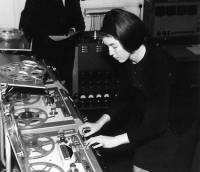
Delia Ann Derbyshire was an English musician and composer of electronic music. She carried out notable work with the BBC Radiophonic Workshop during the 1960s, including her electronic arrangement of the theme music to the British science-fiction television series Doctor Who. She has been referred to as "the unsung heroine of British electronic music", having influenced musicians including Aphex Twin, the Chemical Brothers and Paul Hartnoll of Orbital.
Full Circle is the third serial of the 18th season of the British science fiction television series Doctor Who, which was first broadcast in four weekly parts on BBC1 from 25 October to 15 November 1980.
The Sea Devils is the third serial of the ninth season of the long-running British science fiction television series Doctor Who, which was first broadcast in six weekly parts on BBC1 from 26 February to 1 April 1972. It was written by Malcolm Hulke and directed by Michael E. Briant. The serial is notable as the first appearance of the Sea Devils and features extensive location filming in cooperation with the Royal Navy, as well as an experimental electronic score by Malcolm Clarke.
Malcolm Clarke was a British composer and experimental electronic musician. He was a member of the BBC Radiophonic Workshop, which was based in Maida Vale, London, for 25 years from 1969 to 1994.
Peter Howell is a musician and composer. He is best known for his work on Doctor Who as a member of the BBC Radiophonic Workshop.

The Changes is a British children's science fiction television serial filmed in 1974 and first broadcast in 1975 by the BBC. It was directed by John Prowse and is based on the trilogy written by Peter Dickinson: The Weathermonger (1968), Heartsease (1969), and The Devil's Children (1970).
Dudley George Simpson was an Australian composer and conductor. He was the Principal Conductor of the Royal Opera House orchestra for three years and worked as a composer on British television. He worked on the BBC science-fiction series Doctor Who, for which he composed incidental music during the 1960s and 1970s. When Simpson died aged 95 in 2017, The Guardian wrote that he was "at his most prolific as the creator of incidental music for Doctor Who in the 1960s and 70s, contributing to 62 stories over almost 300 episodes – more than any other composer."
Roger James Limb is a British composer, specialising in electronic music. He is best known for his work on the television series Doctor Who whilst at the BBC Radiophonic Workshop. He joined the BBC as a studio manager, before going on to become a television announcer. In 1972 he left this position to join the Radiophonic Workshop, where he remained until 1995. Although he had received formal music training, he also spent much time in pop and jazz bands, the influence of which can be heard in much of his music.
Elizabeth Parker is a British film and television composer who worked at the BBC Radiophonic Workshop from 1978 until the workshop's closure.
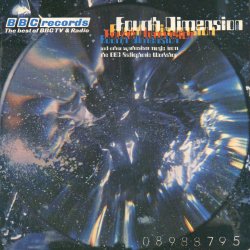
Fourth Dimension is a 1973 BBC Records release featuring recordings created by the BBC Radiophonic Workshop composer Paddy Kingsland. Although it was credited to "The BBC Radiophonic Workshop" it was the work of Kingsland alone, and was the first album of Workshop music to feature only one artist. It features theme tunes used by BBC radio and television. The music prominently features VCS 3 and "Delaware" Synthi 100 synthesisers, both from Electronic Music Studios (London) Ltd, with a standard rock-based session band providing backing. The track "Reg" featured as the B-side to the 1973 single release of the Doctor Who theme.
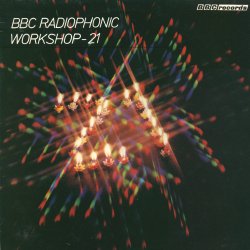
BBC Radiophonic Workshop – 21 is a compilation by the BBC Radiophonic Workshop to celebrate their 21st anniversary in 1979. It was compiled as an overview of their work both old and new, showcasing the changes in the Workshop as they developed from backroom sound effects suppliers for BBC Radio to full-fledged in-house music composers for the whole of the corporation. It demonstrates the move from the musique concrète and tape-manipulation techniques used in the early days, to the synthesiser works of the 1970s. The first side of the album consisted of material from 1958 to 1971, covering their early work creating jingles, sound-effects and some incidental music. This side includes the first material by Workshop founder Desmond Briscoe to be commercially released, as well as sound effects from The Goon Show, Maddalena Fagandini's interval signal that later became "Time Beat", some of Delia Derbyshire's experimental work and the pilot episode version of the Doctor Who theme music. The second side of the record covered the period between 1971–1979, including Richard Yeoman-Clark material from popular BBC series Blake's 7 and Peter Howell's vocoder heavy "Greenwich Chorus" theme for The Body in Question. It was reissued on CD by Silva Screen Records on 22 April 2016.
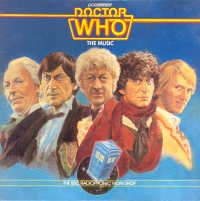
Doctor Who: The Music is a 1983 compilation of music from the BBC Radiophonic Workshop featuring incidental music from the popular science-fiction television series Doctor Who. The album was the first full-length to feature solely music from the programme. The collection was produced by Workshop member and long-time Doctor Who sound-effects creator Dick Mills. It featured the original Delia Derbyshire arrangement of Ron Grainer's theme tune and music by Malcolm Clarke from the 1972 serial "The Sea Devils", which was only the second to have an incidental score provided completely by the Radiophonic Workshop. Most of the music included came from serials from the previous three years to demonstrate the recent composers' works. For the album, each serial's incidental music was reassembled into short "suites" and although most of the music had been recorded in mono it was, for this compilation, remixed into stereo with sound effects added on to some tracks. The album was re-released in 1992 by Silva Screen records as Earthshock - Classic Music From The BBC Radiophonic Workshop Volume 1, with bonus tracks including "The Worlds of Doctor Who", a track recorded by Mills as a B-side to Dudley Simpson's 1973 "Moonbase 3" single, which featured a mix of music with sound effects from Planet of the Daleks before following with Simpson's "Master's Theme" and finishing with music from the serial The Mind of Evil. Selections from both this compilation and its follow-up, Doctor Who: The Music II, were also re-used on the 1994 Silva Screen compilation The Best of Doctor Who Volume 1: The Five Doctors.

The Soundhouse is a 1983 compilation released by BBC Records of music from the BBC Radiophonic Workshop. It featured music composed at the Workshop in the period since the previous compilation, BBC Radiophonic Workshop - 21. During the gap between releases, many advances had been made in the use of computer technology to produce electronic music and this was reflected on the compilation with much of the material having been performed using the Fairlight CMI, the first digital sampling synthesiser. The album included two tracks by Paddy Kingsland used in the television version of The Hitchhiker's Guide to the Galaxy, three electronic realisations of classical compositions and an original collaboration featuring five of the Radiophonic Workshop members entitled "Radiophonic Rock".

Doctor Who at the BBC Radiophonic Workshop Volume 2: New Beginnings 1970–1980 is the second in a series of compilations of BBC Radiophonic Workshop music from Doctor Who. The album collected various incidental music from the 1970s including, for the first time, the complete Malcolm Clarke score for the 1972 serial The Sea Devils, only the second scored completely by the Radiophonic Workshop. The compilation also featured a few of Dudley Simpson's compositions as realised by Brian Hodgson, some Delia Derbyshire music as featured in Inferno, two Peter Howell demos from 1979 and a selection of Dick Mills' sound effects from the era.

Doctor Who at the BBC Radiophonic Workshop Volume 4: Meglos & Full Circle is the final instalment in the Mark Ayres compiled series of releases of BBC Radiophonic Workshop music. It featured music, by Peter Howell and Paddy Kingsland, for the 1980 Doctor Who serials Meglos and Full Circle. It was the first full releases of both scores, although some sound effects from the serials appeared on the previous volume.
David Cain was a composer and technician for the BBC Radiophonic Workshop. He was educated at Imperial College London, where he earned a degree in mathematics. In 1963, he joined the BBC as a studio manager, specialising in radio drama. He transferred to the Radiophonic Workshop in 1967 where he composed various jingles and signature tunes as well as the complete incidental music for the BBC's radio productions of The War of the Worlds in 1967, and The Hobbit in 1968. He also produced the Workshop's 1973 adaptation of Isaac Asimov's Foundation series. He remained with the Radiophonic Workshop until 1973. His 30-second composition "Crossbeat" was used as the original theme for the Australian Broadcasting Corporation's morning radio current affairs program AM, which premiered in 1967.
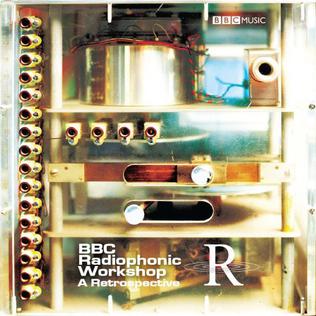
BBC Radiophonic Workshop – A Retrospective is a 2008 compilation of music and effects from the BBC Radiophonic Workshop. It was released to commemorate the 50th anniversary of the establishment of the workshop and includes material ranging from then to its closure. Many of the tracks were previously released on the BBC Radiophonic Workshop - 21 and The Soundhouse.
This is the discography of the BBC Radiophonic Workshop, a British electronic music group. It consists of releases of music and sound effects.









